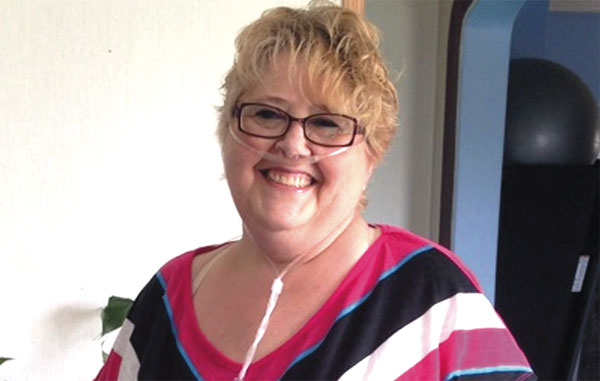Bawlf woman denied life-saving drug for rare lung disease

Cindy Charpentier of Bawlf has always been a fighter; she says that started from birth when medical staff tried to keep her mother from giving birth to her until the doctor arrived, and she fought her way out anyway.
Charpentier, now 55, has a different fight on her hands now, she is dealing with a rare and fatal condition called Idiopathic Pulmonary Fibrosis, or IPF.
IPF has no known cause, and to date no cure. This progressive lung disease didn’t even have any real treatment options until the fall of 2012, when Health Canada approved a new drug called Esbriet, not as a cure, but as a way to slow down the deterioration of the lungs caused by IPF.
Charpentier finds this disease paticularly hard because she’s been active all her life. Born the sixth child of seven, she was a tomboy growing up; she remembers walking the pastures of the family farm with the dog, and pockets full of rocks, something she never fully outgrew.
Until just a couple of years ago, her favourite thing to do each summer was to pitch a tent at the old homestead, where her sister still lives, and spend the summer camping near the family dugout with the kids, building campfires at night and enjoying the great outdoors.
Now that she is permanently on oxygen, the campfire is definitely out of the picture, as is the camping itself.
For the first three years, Charpentier struggled with the disease without a diagnosis, going from being active and self supporting to being unable to work and needing to rely on AISH funding to pay her rent and groceries. “That’s a mighty blow,” Charpentier says.
Her life hasn’t been without challenges and she’s always faced them head-on, but dealing with IPF will be her biggest struggle yet.
Married at 16, “It’s easy for me to look back now and see how incredibly bullheaded I was,” she says, Charpentier was a mother at 17, to daughter Angela.
That first marriage just did not work out, and she says she didn’t leave as soon as she might have, “It was definitely a case of cutting off your nose to spite your face,” she laughs, “I didn’t want anyone to say ‘I told you so’.”
Fast forward five years, and an older and more mature Charpentier marries her soul mate. Husband Barry shared her love of the outdoors, and the couple would camp out and enjoyed duck and deer hunting together.
In March of 1981, their son was born with a rare disease called Werdnig-Hoffman’s disease, a genetic, recessive disorder where a cell is missing from the patient’s spinal column affecting muscle control, including breathing. Baby Steven died when he was just five months old. “Needless to say, it was devastating; we didn’t think we’d survive the pain,” Charpentier says.
Feeling they could beat the odds, the couple tried again, and son Lane was born healthy in September 1983.
Shortly afterward, the couple took in her teenaged niece and nephew, and Barry took a job on the rigs to support their expanded family.
In February of 1985, while returning home from the job, husband Barry was killed in a vehicle accident
“I thought I would die,” Charpentier says, “but as difficult as it was, life went on.”
Charpentier says that during the period following her husband’s death, she made all kinds of mistakes, but one thing she will never regret is the birth of her third child, Alyssa.
She remarried in 1987, and stayed with her third husband for 13 years, but says both finally realized they made better friends than husband and wife so they parted ways.
Charpentier says through her life her jobs have been many and varied. “Often taken because that was all I could get at the time.”
In 2006, however, she took a Personal Aide course through Bethany, and passed with honours. She worked at Bethany for a while, then worked with adults with developmental disabilities at CAFCL, “and I never looked back.”
Charpentier worked there for five years and nine months, “I loved it, and it broke my heart to have to leave.”
In 2006, Cindy was planning to upgrade her education, she was pursuing post-secondary courses in accounting.
Then in 2007, she says, “My breathing changed. I was always short of breath.”
She quit smoking in 2008, but it didn’t get any better. Charpentier saw doctors and specialists and got many different diagnoses that first year, at one point she thought her problems might be environmental and she moved a few times before ending up in Bawlf.
By Christmas 2009, her condition was much worse, and she spent New Year’s 2010 in Emergency, where she says a new doctor told her she had Lung Fibrosis; it was the first time she’d heard the term.
“Of course, my friends tell me ‘You just can’t get anything everyone else has, can you?’” Charpentier says.
In June 2012, she finally had to stop working altogether, as her condition makes it impossible for her to breathe or exert herself physically.
IPF causes scarring of the lungs, and over time, the scarring leads to progressive restriction in breathing; patients eventually die from respiratory failure.
The median survival time for those after receiving a diagnosis of IPF is between two and five years, giving IPF a higher mortality rate than some malignancies, including pancreatic, lung, and liver cancers.
The Canadian Pulmonary Fibrosis Foundation estimates that only 3,000 to 5,000 Canadians suffer from mild to moderate IPF.
Some hope for those suffering from IPF came when just last year, in October 2012, Health Canada approved a new drug called Esbriet (Pirfenidone), following a review that was given priority because there was a significant unmet medical need for treatment options for IPF patients.
Esbriet has been shown to slow the progression of scarring in the lungs, and to be effective in decreasing the decline in lung function.
In April, however, the Canadian Drug Expert Committee, or CDEC, recommended that Esbriet not be listed on approved drug plans, so unless Charpentier is able to spend approximately $3,500 a month on the medication, she says, she won’t have access to the drug, because Alberta won’t finance it. She does not have the financial resources to finance it herself.
Going through multiple moves while trying to determine the cause of her breathing problems, and selling most of her belongings, Charpentier currently lives in Bawlf where she rents a room from a friend.
Bawlf is home for her, she was raised just south of town. “It’s an awesome community,” she says.
Charpentier says she’s tried to talk to her MLA, Doug Griffiths about getting funding for the drug she’s anxious to try, but as he is the Minister of Municipal Affairs, recent catastrophic flooding has made it difficult for her to get in touch with him personally. She’s hoping that he can help.
Charpentier’s only other hope for treatment would be a lung transplant, she says, but adds that her specialist told her she probably wouldn’t qualify for a transplant. “It was hard to pin him down on exactly why that was so,” she said, other than the need to lose weight.
Charpentier says that it’s getting to the point for her now where it seems to her like the medical system is giving up on her. She says the last time she visited one of her specialists she was told her there was no point in her even coming back, that there was nothing he could do for her.
“I don’t understand why my old specialist took that attitude,” she says.
It wasn’t until Charpentier was admitted to the Royal Alex hospital with a shockingly low blood oxygen level of 26 per cent, (optimal is 95-100 percent) that she got a different reaction from her medical team. She says, “They were shocked that I had not even spoken to the transplant team.
“It was such a different attitude at the Royal Alex. There, they encourage you to fight to live.”
Since Charpentier’s doctor had written a request to Alberta Health about her getting coverage for Esbriet, she wanted to get the response before she changed doctors. Unfortunately, the response was negative, there is no coverage available to her at this time.
Charpentier says that Alberta Health told her they will consider covering the cost of the medication if it works for her, but she has no means of getting the medication without their assistance, and no sense of how long she would have to foot the bill before they would agree to cover Esbriet.
“I’m getting to the point now…. My whole life has been a struggle. I’m a fighter, but I get tired of fighting for everything.”
IPF has taken everything from her, she says, leaving her unable to do many of the things she has enjoyed all her life, and unable to be there for her children.
The one thing that she has these days to bring her joy is her grandchildren, but even that is bittersweet.
“Now my seven-year-old granddaughter is having trouble remembering when things were different, and that just about breaks my heart.
“My new granddaughter Madison will only ever know me as the sick grandma with the hoses.
“Who knows if I will even be alive to meet my great-grandson in September?”
Charpentier says she would really like the government to step up and cover this medication, so she has more time to spend with her family.
“Hopefully enough time to lose weight and get on the transplant list,” she says.
Charpentier says they discovered that despite her breathing problems and lung function, her heart is very strong. “So I know if I make it as far as that I will survive the operation.
“That’s where that ‘slight’ bullheadedness comes in handy.”
The Canadian Pulmonary Fibrosis Foundation is trying to help Charpentier by reaching out to local media, in the hopes that more people who know, the more pressure can be brought to bear to cover Esbriet under Alberta’s publicly funded prescription drug plan.
Leslie Cholowsky, Editor









